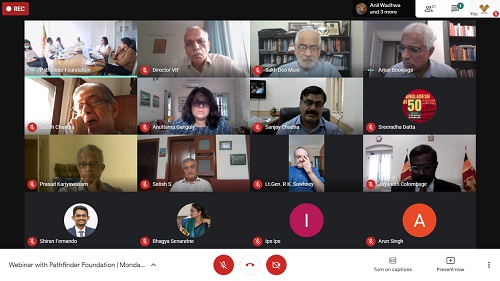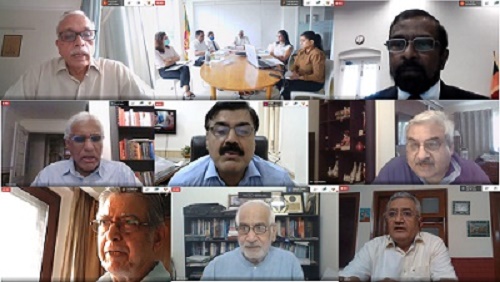On 17 August 2020, the Vivekananda International Foundation (VIF) organised a bilateral meeting in collaboration with the Pathfinder Foundation (Sri Lanka) on “India - Sri Lanka relations”. Dr Arvind Gupta - Director of the VIF, welcomed the participants - Amb. Bernard Goonetilleke, Chairman of Pathfinder Foundation; Admiral Prof Jayanath Colombage, Foreign Secretary of Sri Lanka; Dr Indrajit Coomaraswamy, Former Governor of the Central Bank, Sri Lanka; Mr Sanjay Chadha - Additional Secretary, Ministry of Commerce and Industry, India and Amb Anil Wadhwa, Former Secretary (East) in the Ministry of External Affairs, India. Amb Prasad Kariyawasam, Former Foreign Secretary and High Commissioner for India from Sri Lanka also participated in the meeting. From the VIF - Amb Satish Chandra, Lt Gen Ravi Sawhney, Prof S.D. Muni, Dr Sreeradha Datta, Mr Aayush Mohanty and Ms Cchavi Vasisht participated in the bilateral meeting.
Dr Arvind Gupta and Amb Bernard Goonetilleke delivered the opening remarks on behalf of their respective institutes. The discussion was broadly spread over the Indo- Sri Lanka economic and security relations in the geopolitical environment. The timing of the bilateral meeting is significant as the unprecedented COVID-19 pandemic hits the world. However, the challenges posed by COVID-19 also provide new opportunities to cooperate in health and economic sectors. The political situations have also changed in both countries. Indian Prime Minister (PM) Narendra Modi led government-initiated reforms by the abrogation of Article 370 of the Indian Constitution and resolution of the Ayodhya Mandir (temple) issue. The 16th parliamentary elections in Sri Lanka held on 05 August 2020, elected Mahinda Rajapaksa as their Prime Minister. The increasing relevance of Indo-Pacific region in international politics has made it imperative to ensure close cooperation between India and Sri Lanka.

The two countries are also engaged through various regional platforms such as SAARC and BIMSTEC and bilateral agreements such as the India – Sri Lanka Free Trade Agreement (ISL-FTA), Double Taxation Avoidance Agreement (DTAA) and several MoUs. The multifaceted nature of economic relations between the two countries is reflected in the fact that India is Sri Lanka’s third-largest trade partner and third-largest source of investments from 2015 to 2019. India has also been a source of concessional and grants assistance to Sri Lanka. The ISL-FTA has often created doubts about the success of the agreement and has damaged the Sri Lankan economic interests. This is due to the widening trade deficit that Sri Lanka has currently with India. However, the success of FTA implementation is much more nuanced.India’s recent minimum import price for pepper spice to protect Indian farmers was also mentioned as a minor irritant between the two neighbours. The experts raised concerns about the increasing mechanisation of the fisheries sector in Sri Lanka. The Joint Working Group (JWG) met last in 2017 and efforts must be made to revive the JWG. Even though the Economic and Technical Cooperation Agreement (ETCA) has the potential to benefit Sri Lanka tremendously, but there is resistance in negotiating and implementing the agreement.
India’s strategic interest to ensure regional security in the neighbourhood was discussed during the meeting. The recent Chinese intrusions in the northern border are a cause of worry for stability in the region. China’s changing nature of economic developmental aid to include military aspects is a cause of concern as has happened in the Maldives. Such a situation is feared to happen in Sri Lanka as well. Despite Dr Subrahmanyam Jaishankar, the Minister of External Affairs, statement that India is not working in any alliance, initiatives such as QUAD grouping have created mistrust in the region. Since 2008, militarisation in the Indian Ocean has increased with the growing number of warships in the region. The two neighbours must work under the IORA (Indian Ocean Rim Association) and initiatives such as SAGAR (Security and Growth for All in the Region). Organisations such as VIF and Pathfinder Foundation must work together to build trust and cooperation between both countries.

The discussion emphasised the issues, which the two countries could establish stronger relations in the future. First, due to the asymmetric economic relations, the larger country (India) must ensure a rule-based framework for the advantage of the smaller country (Sri Lanka). India has accepted the principles of non-reciprocity and Special and Differential Treatment (SDT). Second, it is in India’s strategic interest is to ensure that regional security in neighbourhood lies in close strategic cooperation with Sri Lanka. Third, improved connectivity and logistics infrastructure in both countries would help boost economic and trade links between the two countries. The fourth component is the smooth implementation of Goods and Services Tax (GST), which could act as a positive motivation for Sri Lankan businesses in India. Finally, ‘People to People’ (P2P) relations via tourism interactions and educational exchanges would strengthen further cooperation. Both, India and Sri Lanka could collaborate in R&D of COVID-19 vaccines and ensure the accessibility of the vaccines to all. India’s assistance during COVID-19 to Sri Lanka is widely appreciated. The Reserve Bank of India (RBI) signed a currency swap agreement with the Central Bank of Sri Lanka (CBS) in July 2020.
Dr Arvind Gupta delivered the concluding remarks. He agreed with the discussion that there is a need to press the“reset” button. Many works need to be redone, and numerous issues need to be resolved. Several favourable factors in building economic and trade relations must be explored, and connectivity must be given utmost priority. Therefore, there is a pertinent need to closely collaborate and expand the knowledge of India among Sri Lankans to eliminate the mistrust. Given the strategic importance of Sri Lanka, there is a need to work towards a ‘collective security arrangement’ to ensure that no one nation encroaches on each other sovereignty.







Post new comment